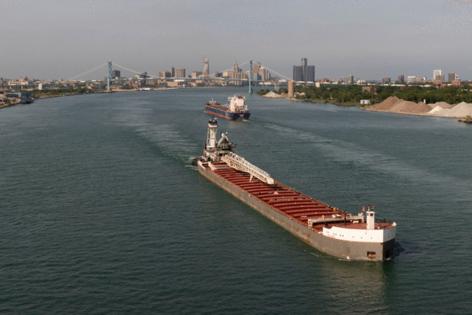UM team selected to lead maritime strategy development for Michigan
Published in News & Features
The state of Michigan has picked a team from the University of Michigan's Naval Architecture & Marine Engineering department for nearly $200,000, yearlong project to develop a maritime strategy for the state.
The project awarded by the Department of Environment, Great Lakes, and Energy is part of moving toward Michigan's goal of being 100% carbon neutral by 2050 under the MI Healthy Climate Plan.
The university's team will produce a strategy document at the end of a year, along with a proposed implementation plan targeted at stakeholder groups who will be involved in the process.
Transportation accounts for 28% of carbon emissions in the U.S., with 3% coming from boats and ships, according to Gregory Keoleian, co-director of UM's Center for Sustainable Systems. Keoleian is a professor in the School for Environment and Sustainability, which is partnering with the Naval Architecture and Marine Engineering Department for the maritime strategy development.
"The Healthy Climate Plan focuses a lot on ground-based transportation. This effort is really to also address opportunities in with ships and boats. So it's really exciting that way," he said.
Thomas McKenney, a UM associate engineering professor leading the project, said decarbonization is a key way to reduce damage done to the planet by climate change, but while sustainability is rooted in environmental stewardship, it has social and economic impacts as its other main pillars of consideration.
"You can't have sustainability if there's not economic viability, right?" McKenney said. "So we can't decarbonize the Michigan maritime industry at the cost of ... losing jobs and and tanking the industry."
He said one goal of the strategy is to bring together initiatives into a holistic approach to decarbonization in Michigan's maritime industry.
The Great Lakes-St. Lawrence Governors and Premiers, an intergovernmental organization of Great Lakes states and Canadian provinces, has looked at the possibility of electric battery-powered ferries as a way to reduce pollution from the region's maritime industry. A leader for the group has said ferries are good candidates for electric power because of their short, predictable routes and frequent stops.
Use of biodiesel to power ships and trucks in the shipping industry has been suggested by the Detroit/Wayne County Port Authority and Southwest Detroit Environmental Vision, which aim to get the port's carbon emissions to zero by 2040. Proponents say it can be used in existing engines, an advantage over other renewable energy sources. But plant-based fuel comes with its own divisions, because of the environmental footprint of the field crops needed to produce it.
Initiatives to mitigate climate change involve consideration of equity and justice as well.
That can mean things like considering the exposure to pollutants and emissions of communities near ports and making sure cleaner transportation options are affordable to use to ensure accessibility, Keoleian said.
The UM team plans to engage with state, local and federal agencies, and port authorities, terminal operators, ship owners, recreational boaters, marina operators, and tourism organizations and community organizations, according to a release from EGLE.
Keoleian said part of giving stakeholders an opportunity to be heard means making sure people affected by shifts from a sector that has fueled jobs and economic growth aren't ignored.
"We are looking forward to working with stakeholders to inform them about the benefits of the transition and also listen to the concerns, because that's what's going to be necessary to accelerate clean energy transition."
________
©2024 www.detroitnews.com. Visit at detroitnews.com. Distributed by Tribune Content Agency, LLC.







Comments